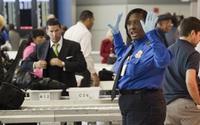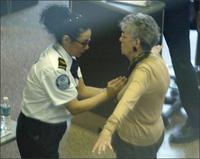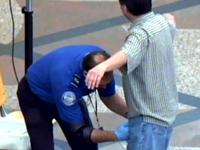-
Al Qaeda seeks to surgically implant bombs into "martyrs'" bodies
Al Qaeda operatives are looking for ways to defeat the growing number of full-body scanners at airports around the world; they recently tried to deploy a pair of kamikaze canines on a U.S.-bound airplane from Baghdad airport; the bombs were placed inside the dogs’ bodies, but the plot failed because the bombs were so poorly stitched inside the dogs, that the dogs died; Web sites affiliated with al Qaeda are now calling of doctors and scientists sympathetic to the organization to help it devise ways for surgically stitching bombs inside human beings, to usher in what one of the organization’s operatives calls a “new kind of terrorism”
-
-
Harvard law students sue TSA over pat-downs, full-body scanning
Two Harvard law students sue TSA, seeking to rein in use of full-body scans and pat-downs at airports; this is at least the sixth suit filed against the TSA since the agency put the enhanced screening procedures into widespread use following the so-called underwear bomber’s unsuccessful attempt to blow up a plane last Christmas with explosives hidden beneath his clothes; the pat-downs, which include “prodding and lifting of genitals and buttocks,” is so intrusive that, “if done non-consensually, would amount to sexual assault in most jurisdictions,” the Harvard students’ complaint says
-
-
Virginia politician: TSA's "enhanced pat-downs" part of "homosexual agenda"
Eugene Delgaudio, a Loudon County, Virginia, supervisor e-mail constituents to say that “The next TSA official that gives you an ‘enhanced pat down’ could be a practicing homosexual secretly getting pleasure from your submission”
-
-
Manchester Airport biometric gate unilaterally imprisons traveler
Manchester Airport has been testing biometric gates in one of its terminals; the gates work by scanning the passenger’s face using a camera and matching this to the image stored on the passport; if there is a match, the gates open and the passenger is allowed through, removing the need to speak to an immigration officer; the watchdog for the U.K. Border Agency says, however, that the facial recognition checks at Manchester Airport are being undermined by unreliable IT
-
-
Third lawsuit filed over TSA airport screening

A Colorado attorney has asked a federal judge to order the Transportation Security Administration (TSA) to abandon its airport screening procedures for U.S. citizens; the suit claims that the patdowns the plaintiff, his two daughters, ages 9 and 15, and a family friend were subjected to in San Diego were “disgusting, unconscionable, sexual in nature” and in violation of the Constitution’s protections against unreasonable searches; nationally, at least two other lawsuits have been filed over the TSA’s new procedures; public opinion appears to be shifting against TSA’s “enhanced patdowns,” even as support for full-body scanning appears to remains high
-
-
All airlines flying to the U.S. now gather passenger information for terror check
All 197 airlines that fly to the United States are now collecting names, genders, and birth dates of passengers so the government can check them against terror watch lists before they fly; getting all air carriers that travel to or through the United States to provide this information marks a milestone in the government’s counterterror efforts and completes a recommendation of the special commission that studied government shortcomings before and after the 9/11 attacks
-
-
Versatile terahertz technology could help aircraft to land
Terahertz scanners detect a type of high-frequency electromagnetic radiation emitted by anything with temperatures higher than around 10 kelvin; it can penetrate dry, non-metallic materials such as clothing or sand, but is absorbed by water and metal; terahertz thus makes for very accurate airport scanners — but the technology can also be used to help aircraft land in poor visibility or power high-bandwidth communication systems
-
-
Napolitano says scanners may be used for trains, subways, and boats
DHS secretary Janet Napolitano says that full-body scanners may be deployed in train stations, on subway platforms, and in marinas; experts point out that terrorists would not necessarily need to board a train to do damage: train graffiti is one indication how easy it to access parked trains — and trains roll on miles and miles of exposed track in open landscapes
-
-
Full-body scanner privacy concerns could be easily solved
A U.S. government scientists involved in developing the full-body scanner says privacy concerns can be easily addressed by adding a simple algorithm to the scanners’ computer code; the algorithm distorts the body image into “grotesque” shapes without degrading the scanner’s detection capabilities
-
-
Tungsten-lined undies protect naughty bits from radiation
A Colorado company offers an attractive line of tungsten-lined undies, aimed, the company says, to protect “the traveling public, airline, medical, and security professionals from radiation generated by security and medical imaging equipment”; business is booming
-
-
Behavior-based solution keeps airports secure, passengers' privacy intact
Israeli company WeCU says its behavior-based security solution addresses many of the problems now encountered at U.S. airports; the WeCU concept exploits human characteristics and behavior: when a person intends to carry out a particular activity or has a significant acquaintance or involvement with a subject, he carries with him information and feelings that are associated with the activity or the subject; the WeCU system identifies this associative connection by actively exposing the person being screened to stimuli targeted at a specific threat, followed by detection of the person’s physiological reaction, or response, to the stimuli through nonintrusive biometric sensors; the system detects the individual’s reaction without his or her knowledge and without requiring their cooperation, and without interfering with routine activities
-
-
Full-body-scan "opt-outs" at U.S airports at normal rate
The organizers of the airport screening “National Opt-Out Day” hoped to exploit the American public’s anger at, and dissatisfaction with, the current state of affairs — anger that found expression earlier this month in the midterm elections — for a spectacular demonstration which would paralyze domestic air-travel during the busy Thanksgiving travel period: they called on travelers to opt-out of full-body scanning, thus forcing TSA screeners to pat them down, bringing air travel to a halt; the organizers failed to reckon with two set of numbers: fewer than 3 percent of travelers receive pat-downs, and the vast majority of Americans — as much as 80 percent — approve of full-body scanners being used at U.S. airports; the result: the stunt has failed, and the number of travelers opting out of full-body scans is not higher than normal
-
-
Lawmakers demand better TSA pat-down training

Lawmakers write the president, TSA to demand a better system of security checks at airports; demand ; “Surely it is possible to secure an airplane without sacrificing individual liberties or privacy. We can utilize bomb-sniffing dogs, AIT machines as a method of secondary screening, and behavioral profiling to accomplish the shared goal of safe and secure air travel,” Rep. Jason Chaffetz (R-Utah) wrote Obama; “These new searches are a novel procedure both for the traveling public and your front line TSA officers, and I am not convinced the Transportation Security officers have received adequate training in what is clearly an invasive procedure,” Senator Olympia Snowe (R-Maine) wrote the TSA administrator
-
-
FAA to require photos, but no biometric info, on pilot's licenses
The Federal Aviation Administration (FAA) has proposed that all pilot certificates include a photo of the licensee, but one lawmaker wants to know why the passport-size cards will not include biometric identification five years after Congress passed a law requiring such unique identifiers
-
-
TSA to make airports screenings "minimally invasive"

The head of the Transportation Security Administration (TSA), facing protests from travelers and pressure from the White House, appeared to give ground Sunday on his position that there would be no change in policies regarding invasive passenger screening procedures; John Pistole said in a statement that the agency would work to make screening methods “as minimally invasive as possible,” although he gave no indication that screening changes were imminent; still, he pointed to the alleged attempt by a Nigerian with explosives in his underwear to try to bring down an Amsterdam-to-Detroit flight last Christmas. “We all wish we lived in a world where security procedures at airports weren’t necessary,” Pistole said, “but that just isn’t the case”
-
- All
- Regional
- Water
- Biometrics
- Borders/Immig
- Business
- Cybersecurity
- Detection
- Disasters
- Government
- Infrastructure
- International
- Public health
- Public Safety
- Communication interoperabillity
- Emergency services
- Emergency medical services
- Fire
- First response
- IEDs
- Law Enforcement
- Law Enforcement Technology
- Military technology
- Nonlethal weapons
- Nuclear weapons
- Personal protection equipment
- Police
- Notification /alert systems
- Situational awareness
- Weapons systems
- Sci-Tech
- Sector Reports
- Surveillance
- Transportation
Advertising & Marketing: advertise@newswirepubs.com
Editorial: editor@newswirepubs.com
General: info@newswirepubs.com
2010-2011 © News Wire Publications, LLC News Wire Publications, LLC
220 Old Country Road | Suite 200 | Mineola | New York | 11501
Permissions and Policies
Editorial: editor@newswirepubs.com
General: info@newswirepubs.com
2010-2011 © News Wire Publications, LLC News Wire Publications, LLC
220 Old Country Road | Suite 200 | Mineola | New York | 11501
Permissions and Policies
